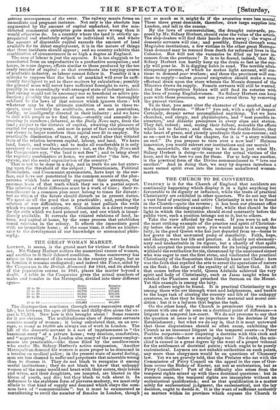THE GREAT WOMAN MARKET.
LONDON, it seems, is the grand mart for victims of the female sex. Mr.Sidney Herbert notices the numerical excess of women, and ascribes to it their debased condition. Some controversy has arisen on the amount of the excess in the country at large, but as to London it remains undisputed ; and indeed the Times, aided by the Companion to the British Almanack for 1844, and its abstract of the population census in 1841, places the matter beyond a doubt. A table in the Companion gives the actual numbers of males and females in the Metropolis, divided into their different ages—
Males. Females.
15 to 20 79,031 93,011 20 to 25 89,770 116,326 25 to 30 82,315 100,155 30 to 35 78,247 92,193 15 to 35 329,363 401,685
The disproportion continues through every successive stage of life ; but between the ages of fifteen and thirty-five alone the ex- cess is 7:2,312. Now how is this brought about ? Some reasons for it are obvious. The multitudinous class of domestic servants consists mostly of women; it being calculated that, on an ave- rage, as many as 10,000 are always out of work in London. The life of the domestic servant is a sort of imprisonment in " the basement story" of a private house ; very desolate, comfortless, and " aggravating." In London also many of the poorer employ- ments are practicable,—like those filled by the needlewomen who excite Mr. Sidney Herbert's active compassion. 'Another Metropolitan demand for women is more proper to be discussed in a treatise on medical police; in the present state of moral feeling, men are less shamed to suffer and perpetuate that miserable wrong than to discuss it. They do not blush to recognize it among useful institutions ; they do not blush to know that unhappy women of the same mould and heart with their sisters, their lovers and wives, and their daughters, are tempted, are blasted in the bloom of youth, and die; but they blush to talk about it. In deference to the stubborn form of perverse modesty, we must only allude to that kind of supply and demand which obeys the com- mon laws of "commercialism ": but it must be enumerated as contributing to swell the number of females in London, though not m much as it might.do if the avocation were less mortal. These three great demands, therefore, draw large supplies into London, and tell in the census.
By the laws of commercialism, the draught outwards, pro- posed by Mr. Sidney Herbert, should raise the value of the article. The slop-dealers will find their hands drawn away ; the wages of domestic servants will rise; and posiiibly, filtered through some Magdalen institutions, a few victims to the other great Metropo- litan demand may be rescued from death for reformed lives in the Colonies. But will not the vacancies be filled up by new in. comers from the provinces ? It is to be feared, indeed, that Mr. Sidney Herbert can hardly keep up the drain so fast as the sup- ply will pour in. It is digging holes in sand. The terrible ultra. cheapening process, of which he makes light account, will con- tinue to demand poor workers; and those the provinces will con- tinue to supply—unless general emigration should make a more effectual drain upon the store whence the Mosaic demand of the Minories draws its supply. Female servants will still be wanted. And the Metropolitan Sphinx will still feed its votaries with the lives of young Englishwomen. No Sidney Herbert can keep pace with those processes, nor can you arrest them by removing the present victims. To do that, you muat alter the character of the market, and of the chapmen therein. "How?" you ask, with a sigh of despair. Certainly, despair never accomplished anything. Yet we have churches, and clergy, and physiologists, and best possible in- structors," and didactic preceptors in every class and station. They fail, indeed ; and, seeing their failure, redouble the efforts which led to failure; and then, seeing the double failure, they take heart of grace, and piously quadruple their non-success; and so on—not to the end of the chapter, for it is " a story without an end." Do you propose to turn over a new leaf? Heinous innovator, you would subvert our institutions and our morals I So, meanwhile, the only thing to be done is just what Mr. Sidney Herbert is doing—to succour the actual victims of the hour, and do the beat we can for them. For to help one another, is the practical form of the Divine commandment to " love one another." And in doing that, we may by degrees introduce a more sacred spirit even into the immense unhallowed woman- market.


























 Previous page
Previous page